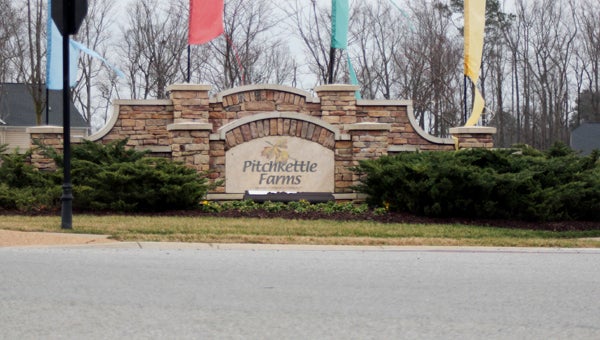Another lawsuit
Published 11:07 pm Thursday, February 7, 2013

Homes in the developing Pitchkettle neighborhood are involved in a lawsuit against the city of Suffolk over assessments. The subdivision is the site of the 2006 Homearama, after which real estate prices plummeted.
Developer claims unfair assessments
A property developer who has filed a $100,0000 lawsuit says the city can only avoid litigation by refunding property taxes and lowering assessments on about 71 residential parcels off Pitchkettle Road.
Jeff Ainslie said the potential trial, which he hopes will ultimately be avoided, is on hold while negotiations continue.
“We are anticipating that we are going to work this out without going to court,” he said Thursday, adding that the two parties have met once already and were set to meet again Friday.
“We’re not trying to get out of paying what we owe; we just want everybody to be paying what they should be paying,” he said.
Court records identify about 70 involved parcels around Pitchkettle Estates and Pitchkettle Farms — the site of Homearama in 2006, just before the property market in Suffolk and everywhere else went into freefall.
Refunds totaling about $100,000, plus interest, are demanded for taxes paid between July 2007 and June 2011.
“The properties were assessed by the defendant, the city of Suffolk, at more than fair market value for each of the tax years at issue,” the complaint says.
“The city committed manifest error in making the assessments, used improper methodology, and/or disregarded controlling evidence.
“The assessments of the city are not uniform in their application and are out of line with the assessments of like and similar properties.”
The potential suit, filed in the middle of 2011, is not the only such litigation city officials face; a claim involving 20 lots in North Suffolk’s Governor’s Pointe was lodged with the court in December.
The Governor’s Pointe case, scheduled for a hearing on July 8, also asks for assessments to be reduced to “fair market value” and requests a tax refund, in this case of $33,777.41.
Ainslie said Virginia taxpayers face a tough battle when appealing assessments, as state law places the burden of proof upon them, not the taxing authority.
“For someone who owns a home, or a few lots … to dig up all the details (to prove a case), it becomes cost prohibitive,” he said.
He said that the city of Suffolk, which considers sales in the previous calendar year when determining assessments, was quick to raise assessments when the market began to boom in the first half of the previous decade, but has been too slow to adjust them downward since the market tanked several years ago.
“In this particular case, we think they were a little bit slow to make those changes,” he said.
If talks fail and the Pitchkettle case goes to trial, city assessor Jean Jackson and two other senior staffers from her office are expected to testify for the city, according to court records.
Spokeswoman Debbie George said the city does not comment on pending or potential litigation.
Ainslie’s company Ainslie Group also has assessment suits pending against the cities of Chesapeake and Virginia Beach, he said.





